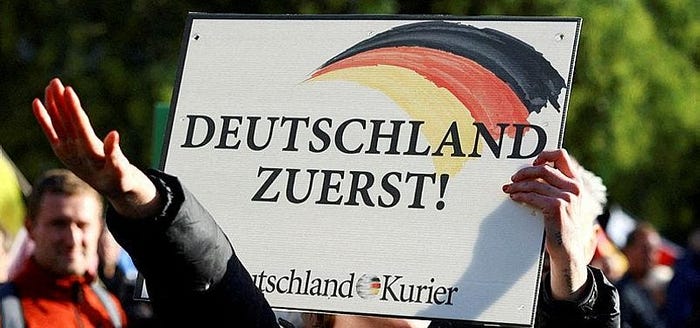Rising Far-Right Politics in the EU and Recent Elections — Germany
The increasing trend towards far-right politics in Europe has become very evident in recent years. Europe has been going through a significant change and transformation process in political and social dynamics in recent years, and as we saw in the recent elections in the EU parliament, far-right politicians seem to have gained weight in societies and established themselves. These movements, organized around themes such as nationalism, anti-immigration, and emphasis on cultural identity, have gained an important place in the political and social landscape of Europe. In this article, I want to focus on the rising far-right politics in Germany.
The rise of the far right in Germany is particularly associated with factors such as immigration crises, economic uncertainties and cultural concerns. However, the rise of the far-right throughout German society is considered a worrying development, and reactions against these movements often arise. There are two representatives of the far right in Germany, one is NPD and the other is AfD. AfD has gained more ground in the political arena, especially in recent years, and has a significant presence in the federal and state parliaments. In this context we need to focus a little more on the AfD, the Alternative for Germany (AfD) has experienced a significant rise in the German political landscape in recent years. Although AfD was founded in 2013, it attracted attention especially with its success in the 2017 federal elections. In these elections, AfD managed to enter the Bundestag with over 12% of the votes and became one of Germany’s main political parties. The rise of the AfD is based on several factors. First of all, the concerns and anxieties created by the immigrant crisis in German society contributed to the popularity of the AfD’s anti-immigrant policies. Additionally, economic uncertainties and criticism of the European Union expanded the AfD’s supporter base. The party is often associated with far-right and populist tendencies and espouses intolerant rhetoric towards immigrants, Islam and other minorities. This situation is considered an important problem for political and social norms in Germany.

The last European Union (EU) Parliament elections in Germany resulted in the victory of the right wing, as expected. While the AfD party became the second party in Germany with a vote rate approaching 16 percent, it became the first party in the east of the country. This situation actually reminded people of Germany’s pre-union situation: pro-EU, Christian democrats in the west of the country, and nationalist and extreme right-wingers defending the German identity in the east.

The most important factor that triggered the far right was the immigrant crisis that started in 2014. Migrations that started and took shape with the wave of migration that increased significantly due to the conflicts in the Middle East, especially the civil war in Syria, had a great impact on Germany, which has the largest economy in the EU. Germany accepted approximately 1 million refugees in 2015, making it a part of Europe. It was exposed to the largest refugee influx in the world. This situation caused significant debates and tensions both socially and politically in Germany. Issues such as integration of refugees, housing problems, integration into the labor market and harmony with local societies became the subject of discussion. The immigration crisis also affected the political atmosphere in Germany. The government led by Angela Merkel has sparked controversy by adopting a far-reaching approach to accepting refugees into Germany. This caused divisions both within the government and society and increased the support of far-right and populist parties.

The future of racist politics in Germany is uncertain and is influenced by many factors. However, strong institutions and leadership that preserve social diversity, economic prosperity, and democratic values can prevent the spread of racist and far-right politics and hold society together. In this context, Germany’s political unity is a very important point for the future of the EU. In Germany, the importance of protecting democratic values and fighting against far-right ideologies must be constantly emphasized.

